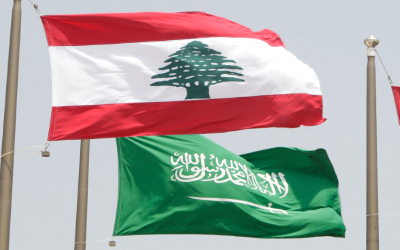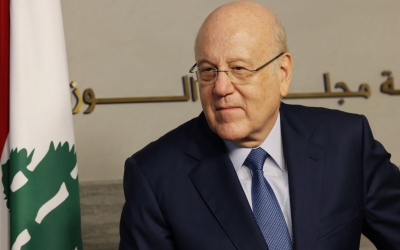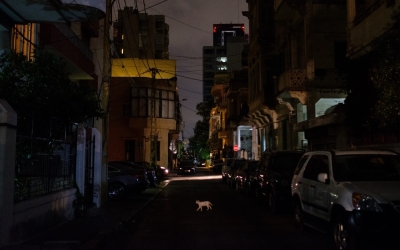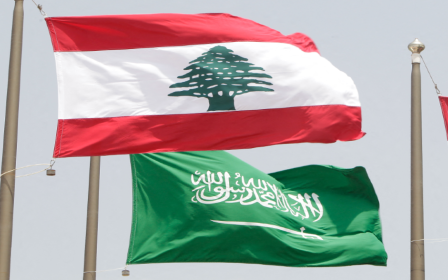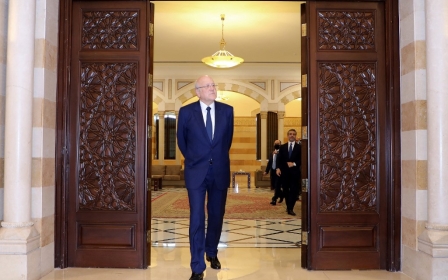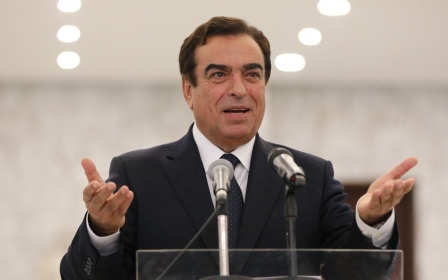Lebanon: Gulf diplomatic crisis mounts over minister's Yemen war comments

Pressure was mounting on Saturday for Lebanon’s minister of information to resign, after his comments on the Saudi-led military offensive in Yemen sparked a diplomatic crisis with Riyadh and other Gulf states.
The Lebanese cabinet held an emergency meeting on Saturday, attended by deputy head of the US mission in Lebanon Richard Michaels, in a bid to handle the diplomatic fallout of critical comments made by George Kordahi.
Saudi Arabia ordered the Lebanese ambassador to the kingdom to leave within 48 hours on Friday and recalled its ambassador to Lebanon for consultations in response to Kordahi’s comments, which were broadcast earlier this week by Al Jazeera.
Riyadh condemned the deterioration of relations with Lebanon and said "further measures" would be taken against Beirut, without elaborating.
Bahrain, Kuwait and the United Arab Emirates have followed in Saudi Arabia's footsteps and also asked their Lebanese ambassadors to leave, as well as recalling their ambassadors to Beirut for consultations on Friday and Saturday respectively.
Saudi Arabia and Gulf allies including the UAE have led a military coalition fighting against the Iran-aligned Houthis since 2015.
In an interview recorded over a month before he was sworn in as minister of information, Kordahi said that Yemen's Houthi rebels were “defending themselves”. He described the years-long war in the country as "futile".
Lebanese President Michel Aoun said on Saturday that he wants the best relations with Saudi Arabia.
Translation: President Aoun: It is necessary that communication between the two countries be at the level that Lebanon aspires to in its relations with the kingdom and with the rest of the Gulf states.
But none of the conciliatory statements coming from the Lebanese government seem to have appeased Riyadh and its allies, as the Gulf kingdom has called on the fragile coalition cabinet in Beirut to dismiss Kordahi.
Kordahi was summoned to Bkerki, the seat of the Maronite Catholic Church in Lebanon on Saturday afternoon to meet with Patriarch Bechara Boutros al-Rai and discuss the situation. Upon entering, Kordahi responded to journalists enquiring about whether he would resign by saying: “We’ll see with the patriarch.”
The embattled minister, however, left the meeting through a back door without making a statement.
Pressure to resign
The dispute is the latest challenge to Lebanese Prime Minister Najib Mikati's cabinet, which was sworn in last month after more than a year of political paralysis only to find itself almost immediately embroiled in a political row over the judicial investigation into the August 2020 Beirut port explosion.
In a phone call with Kordahi on Friday evening, Mikati asked his minister to put the national interest first and "take the right decision to fix Arab relations with Lebanon", a statement by his office said - as Riyadh pressured the minister of information to resign.
Kordahi refused to apologise for his statements earlier this week, adding that he had "done no wrong", as the show had been taped on 5 August, more than a month before he became a minister.
"I have never attacked nor insulted Saudi Arabia or the Emirates," Kordahi said on Wednesday, adding that his words "did not implicate at all the government, of which I was not yet a member".
Lebanese Foreign Minister Abdullah Bou Habib said on Friday he was forming a group to address the diplomatic rift. He maintained that the situation was not a crisis and could be solved through dialogue.
The Arab League expressed its concern on Saturday about the rapid deterioration of Lebanese-Gulf relations.
A statement quoting Arab League Secretary-General Ahmed Aboul Gheit appealed to Gulf countries "to reflect on the measures proposed to be taken... in order to avoid further negative effects on the collapsing Lebanese economy".
"Aboul Gheit expressed his deep concern and regret over the rapid deterioration in Lebanese-Gulf relations," the statement said, adding that he was nonetheless confident Aoun and Mikati would act quickly to ease the crisis.
Former interior minister Ziyad Baroud old MEE that the dismissal of any minister can only happen in three specific ways. First, if the minister offers their resignation, which Kordahi has so far declared he is not willing to do. Second, if two-thirds of cabinet members vote them out. Third, if half of parliament votes to impeach them.
Baroud predicted that these three scenarios were unlikely to happen in the current context.
Unprecedented crisis
A high-ranking official within the presidential palace, who spoke on condition of anonymity, told Middle East Eye that “such a crisis would have been avoided if diplomatic relations with Saudi Arabia were based on mutual institutional respect”.
“Saudi diplomacy has adopted an unofficial boycott of Lebanese diplomatic institutions and favoured political relations with pro-Saudi Lebanese actors,” the source said.
Lebanon's politics have long been influenced by regional and international powers sponsoring different parties, which have swayed successive governments through diplomatic pressures and threats of withholding financial support.
Former prime minister Saad Hariri, who resigned as designated premier in July, meanwhile accused the Iran-backed Hezbollah movement on Friday of being responsible for the rift.
'Such a crisis would have been avoided if diplomatic relations with Saudi Arabia were based on mutual institutional respect'
- Lebanese official
"The responsibility, first and foremost, in this regard lies with Hezbollah, and its professed hostility towards the Arabs and the Arab Gulf states," the politician, long supported by Riyadh despite complicated relations, said in a tweet.
Former foreign minister Fares Boueiz told MEE that the diplomatic crisis was unprecedented.
“This crisis is isolating Lebanon from its natural Arab surroundings,” he said, adding that Mikati should have taken into account Kordahi’s stances before appointing him in the cabinet.
However, the former minister, known for being critical of Hezbollah, said the issue went far deeper than one controversial statement.
“It is a deeper crisis, especially as Gulf countries, especially Saudi Arabia, regard Lebanon as subjected to Iranian and Hezbollah influence,” he said. “Kordahi’s statement is merely the tip of the iceberg.”
Saudi Arabia's foreign minister, Prince Faisal bin Farhan al Saud, said on Saturday that the latest crisis with Lebanon had its origins in a Lebanese political set-up that reinforced the dominance of Hezbollah and continued to allow endemic instability.
"I think the issue is far broader than the current situation," the Saudi minister told Reuters in a telephone interview.
"I think it's important that the government in Lebanon or the Lebanese establishment forges a path forward that frees Lebanon from the current political construct, which reinforces the dominance of Hezbollah."
He said this set-up "is weakening state institutions within Lebanon, in a way that makes Lebanon continue to process in a direction against the interests of the people of Lebanon".
Saudi-Iranian battle for influence
While Kordahi, the former host of the Arabic version of the show Who Wants to be a Millionaire?, does not officially belong to a political party, his nomination as minister of information was backed by the Marada party, which is allied with Hezbollah.
Suleiman Frangieh, the head of Marada, told a news conference on Saturday that he had refused an offer by Kordahi to resign and would not name a successor should he do so. However, he later went on to say that he would support whatever decision the minister made.
'It is clear that the pressure Saudi Arabia is facing in Yemen from the Iranian- backed Houthis has led to an escalation in Lebanon as retaliation'
- Amine Kammourieh, analyst
Hezbollah issued a statement praising Kordahi's comments on Thursday.
In May, then-foreign minister Charbel Wehbe resigned after comments he made during a television debate suggesting, among other things, that Gulf states had supported the rise of the Islamic State group, which strained ties with Gulf allies and donors.
For political analyst Amine Kammourieh, the Kordahi crisis was a reflection of Saudi Arabia’s ongoing struggles on the ground in Yemen, as Houthis have closed in on the city of Marib, the last stronghold of the internationally recognised, Saudi-backed government in north Yemen.
“It is clear that the pressure Saudi Arabia is facing in Yemen, especially in the city of Marib, from the Iranian-backed Houthis has led them to an escalation in Lebanon as a retaliation,” he told MEE.
Any Saudi setback in Marib will weaken the Saudi position at the negotiation table with Tehran, Kammourieh added. “The closer we come to an agreement or a failure between Iran and Saudi Arabia in Yemen, the more we will witness similar events in areas where both regional powers have influence,” he predicted.
Financial repercussions
In addition to expelling the Lebanese ambassador, Riyadh has also ordered an immediate halt to all Lebanese imports.
Saudi Arabia had already banned all fruit and vegetable imports from Lebanon in April, blaming an increase in drug smuggling.
The ban comes as Lebanon is already in the throes of one of the worst financial crises of modern times.
Mohammad Chamseddine, a researcher at Information International in Beirut, told Middle East Eye that the current diplomatic spat could affect nearly 377,000 Lebanese people living in the Gulf, 200,000 of whom are in Saudi Arabia.
“The monthly monetary transfers from Lebanese expatriates in Gulf countries amount to $125m,” Chamseddine said. Lebanese exports to Saudi Arabia meanwhile amount to around $221m per year, according to Information International.
Saudi Arabia’s punitive move could further jeopardise Lebanon’s already crumbling economy and further fracture an already divide government.
Middle East Eye delivers independent and unrivalled coverage and analysis of the Middle East, North Africa and beyond. To learn more about republishing this content and the associated fees, please fill out this form. More about MEE can be found here.


